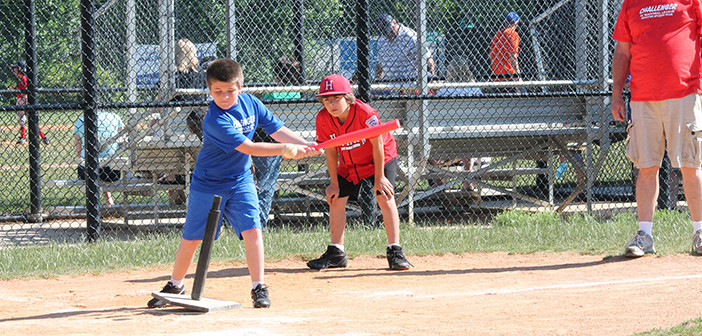By Sarah Colson
Last Saturday morning at Keystone Park in Johnson City, fans cheered, coaches strategized and players slid into home plate. OK, so the fans cheered because no score was kept, the coaches’ only strategy was to have fun, and players sometimes slid into home plate just to watch the dirt swirl into the summer air. At a Challenger League game, scores are kept by how much laughter is had and if that’s the case, it was a high scoring affair indeed.
Established in 1989, Challenger League is a separate division of Little League and is designed to “enable boys and girls (ages 3-21) with physical and mental challenges to enjoy the game of baseball.” The league has a “buddy system” where kids from other Little League teams assist players during the game.
When LaRendi Armstrong was growing up in Madison, Miss., she was one of those buddies. Now she coaches. “It’s just something you have to see,” Armstrong said of the powerful relationships between buddies and players.
Mark Simmons, one of the coaches and a father to one of the players, said, “It’s funny to see how some of them (the buddies) have never even seen these kids before then in a few minutes, they’ve bonded. They’re brothers. They actually listen to one another and the buddies show them things like how to steal bases.”
The Johnson City Challenger League draws its “buddy pool” from the little league teams. Each team gets assigned certain weeks to help out in addition to playing its own regularly scheduled games. Most coaches, Armstrong said, are excited to help and good at encouraging the same attitude in their players.
Armstrong’s son, Joseph, who Simmons calls “Captain Buddy,” has been a buddy since the league began three years ago. His favorite thing about buddying is being able to play alongside his special needs friends.
“I know almost all of them,” Joseph said. “My favorite part is just watching them run the bases and seeing how most of them know what to do before you even tell them.”
Tracey Gallardo is a mom of one of the buddies and has enjoyed seeing her son Zac interact with kids who are different from him.
“We love it,” she said. “Just seeing how well they connect with other kids gives me a grin from ear to ear. They’re just so good with them. They all are out there having fun. It’s just a rewarding thing to watch them (the buddies) help other people.”
The benefits imbued upon the Challenger players from playing were obvious last Saturday as they all participated at full-energy, always a smile or laugh on each kid’s face.
Before the game even began, one little girl named Sierra O’Brien ran around and around the bases and demanded someone let her go to bat. Armstrong said that three years ago when Sierra first started playing, her mom had to carry her around the bases because she refused to play. The difference three years have made is night and day.
Keisha Trent, mother of Rhylee Hinkle, a Challenger league player, said that she loves the opportunity the league gives her child to exercise and make friends.
“It gives our kids a chance to get out and do the same things that their typically-developing peers do, but at their own pace,” Trent said. “That has given Rhylee and our family a chance for Rhylee to be active despite her disabilities.”
Armstrong said the league also gives parents a chance to get out and socialize with other parents who experience the same struggles and lifestyles that may accompany raising a developmentally disabled child. Armstrong is pursuing her masters in early childhood special education from Milligan College and has taught special education in Johnson City Schools for the past nine years. Through that experience, she met her other league coach, Simmons.
Simmons’ interest in Challenger League is personal. He grew up with an older sister with mental handicaps. Then, five years ago, his daughter was born at 1 pound, 3 ounces and with developmental disabilities.
“That pretty much changed my whole perspective and outlook,” he said. “I’m trying to be a better-understanding parent and just educate myself more on the whole thing.”
Simmons’ daughter was in one of Armstrong’s pre-K classes. And while Simmons didn’t immediately turn to coaching when his daughter wanted to play, he couldn’t say no when Armstrong saw him at the mall signing up his daughter for Challenger League.
“’Aaaannnd you’re coaching!’” Armstrong reenacted what she said to Simmons at the mall that day. “I didn’t give him the option of saying no.”
“I couldn’t say no this time,” Simmons agreed.
Simmons’ passion for helping kids with special needs has carried over into his career choice. He is studying psychology at East Tennessee State University and plans to become a childcare specialist. And on weekends when he’s not studying, Simmons is helping his daughter Loretta hit the ball and run bases. He said coaching Challenger League as someone who is raising a child with special needs is a whole different ballgame.
“It’s been a big change but I love it,” Simmons said about where he was five years ago versus now.
“I wouldn’t trade it (coaching) for anything else in the world. I actually get choked up even starting to talk about it. It’s just so different now.
I can’t even explain it.”
The impact coaching has made on Simmons is clear and the opportunity for impact Challenger League has on the Johnson City area is not a small one.
“It just brings awareness to the fact that there are so many kids with special needs here in our community,” Armstrong said.”
Still, the league is small, with only two teams that meet once a week. Both teams go to bat once, with each player getting two turns at hitting. Armstrong said there’s plenty of potential for the league to grow. If more kids sign up, she plans on just adding another team.
For parents like Gallardo, the summer league, which ends June 20, is not just about teaching typically-developing children the importance of making friends with those who are different. For her and others, the league is all about providing an opportunity for more and more kids to do what they’re supposed to do in the summer: have fun.
Gallardo emphasized, “They’re just kids having fun with other kids.”
For more information on Challenger League, contact larendi.armstrong@gmail.com.







